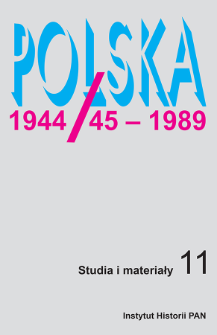- Wyszukaj w całym Repozytorium
- Piśmiennictwo i mapy
- Archeologia
- Baza Młynów
- Nauki przyrodnicze
Wyszukiwanie zaawansowane
Wyszukiwanie zaawansowane
Wyszukiwanie zaawansowane
Wyszukiwanie zaawansowane
Wyszukiwanie zaawansowane

Obiekt
Tytuł: Dziennik intymny jako źródło historyczne
Inny tytuł:
Polska 1944/45-1989 : studia i materiały 11 (2013)
Współtwórca:
Instytut Historii Polskiej Akademii Nauk
Wydawca:
Miejsce wydania:
Opis:
Typ obiektu:
Abstrakt:
The author argues that even an intimate diary, the most subjective type of this genre, can be a valuable source for historical research. Personality is a creation of culture and is influenced by both social process and historical events. An intimate diary is a record of experienced emotions and thoughts, but even when it is far from historical chronicle and lacks the facts of collective life, it contains evidence about specific moments in history and their cultural formations.As an example may serve an intimate diary of Polish writer Zofia Nałkowska, written between 1899 and 1954. The diary encompassed four stages of the history of Poland, with their social and cultural changes.The diarist herself in her youthful diary considered to ‘close her whole life’ in private, confidential notes. And so Nałkowska’s diary, although an asylum of secret meanings, contains the whole richness of social biography of the outstanding writer. A special evidence of that is the description of difficulties with the publication of the diary in the Polish Peoples’ Republic and with censorship interferences. The author of the present article has prepared a critical edition of The Diaries, so she is able to present examples of such interferences into Nałkowska’s text.A separate problem is the question of omitting in the publication of Nałkowska’s negative opinions about living people, which entailed interventions of these people or their relatives. Dramatic forms of protest of Bogusław Kuczyński, Nałkowska’s former partner, have inscribed into a political context of the publication.The wealth of references in Nałkowska’s intimate diary to the history and culture of the time span indicated by her fully supports the thesis put forward in the title of the article.
Czasopismo/Seria/cykl:
Polska 1944/45-1989 : studia i materiały
Tom:
Strona pocz.:
Strona końc.:
Szczegółowy typ zasobu:
Format:
Identyfikator zasobu:
oai:rcin.org.pl:59725 ; 2450-8357
Źródło:
IH PAN, sygn. B.155/11 Podr. ; IH PAN, sygn. B.156/11 ; kliknij tutaj, żeby przejść
Język:
Język streszczenia:
Prawa:
Licencja Creative Commons Uznanie autorstwa-Bez utworów zależnych 4.0
Zasady wykorzystania:
Zasób chroniony prawem autorskim. [CC BY-ND 4.0 Międzynarodowe] Korzystanie dozwolone zgodnie z licencją Creative Commons Uznanie autorstwa-Bez utworów zależnych 4.0, której pełne postanowienia dostępne są pod adresem: ; -
Digitalizacja:
Instytut Historii Polskiej Akademii Nauk
Lokalizacja oryginału:
Biblioteka Instytutu Historii PAN
Dostęp:
Kolekcje, do których przypisany jest obiekt:
- Repozytorium Cyfrowe Instytutów Naukowych > Kolekcje Partnerów > Instytut Historii PAN > Czasopisma
- Repozytorium Cyfrowe Instytutów Naukowych > Kolekcje Partnerów > Instytut Historii PAN > Wydawnictwa Instytutu
- Repozytorium Cyfrowe Instytutów Naukowych > Kolekcje Partnerów > Instytut Historii PAN > Wydawnictwa Instytutu > Czasopisma
- Repozytorium Cyfrowe Instytutów Naukowych > Kolekcje Partnerów > Instytut Historii PAN > Wydawnictwa Instytutu > Czasopisma > Polska 1944/45-1989
- Repozytorium Cyfrowe Instytutów Naukowych > Piśmiennictwo > Czasopisma/Artykuły
Data ostatniej modyfikacji:
2 paź 2020
Data dodania obiektu:
21 wrz 2016
Liczba pobrań / odtworzeń:
370
Wszystkie dostępne wersje tego obiektu:
https://rcin.org.pl./publication/78834
Wyświetl opis w formacie RDF:
Wyświetl opis w formacie RDFa:
Wyświetl opis w formacie OAI-PMH:
| Nazwa wydania | Data |
|---|---|
| Kirchner, Hanna (1930- ), Dziennik intymny jako źródło historyczne | 2 paź 2020 |
Obiekty Podobne
Zaleski, Marek (1952– ) Towarzystwo Autorów i Wydawców Prac Naukowych "Universitas".
Tarnowski, Stanisław (1837–1917)
Viskovatyj, Constantin.
Magnuszewski, Józef (1924–1994)
Tarnowski, Stanisław (1837–1917)

 INSTYTUT ARCHEOLOGII I ETNOLOGII POLSKIEJ AKADEMII NAUK
INSTYTUT ARCHEOLOGII I ETNOLOGII POLSKIEJ AKADEMII NAUK
 INSTYTUT BADAŃ LITERACKICH POLSKIEJ AKADEMII NAUK
INSTYTUT BADAŃ LITERACKICH POLSKIEJ AKADEMII NAUK
 INSTYTUT BADAWCZY LEŚNICTWA
INSTYTUT BADAWCZY LEŚNICTWA
 INSTYTUT BIOLOGII DOŚWIADCZALNEJ IM. MARCELEGO NENCKIEGO POLSKIEJ AKADEMII NAUK
INSTYTUT BIOLOGII DOŚWIADCZALNEJ IM. MARCELEGO NENCKIEGO POLSKIEJ AKADEMII NAUK
 INSTYTUT BIOLOGII SSAKÓW POLSKIEJ AKADEMII NAUK
INSTYTUT BIOLOGII SSAKÓW POLSKIEJ AKADEMII NAUK
 INSTYTUT CHEMII FIZYCZNEJ PAN
INSTYTUT CHEMII FIZYCZNEJ PAN
 INSTYTUT CHEMII ORGANICZNEJ PAN
INSTYTUT CHEMII ORGANICZNEJ PAN
 INSTYTUT FILOZOFII I SOCJOLOGII PAN
INSTYTUT FILOZOFII I SOCJOLOGII PAN
 INSTYTUT GEOGRAFII I PRZESTRZENNEGO ZAGOSPODAROWANIA PAN
INSTYTUT GEOGRAFII I PRZESTRZENNEGO ZAGOSPODAROWANIA PAN
 INSTYTUT HISTORII im. TADEUSZA MANTEUFFLA POLSKIEJ AKADEMII NAUK
INSTYTUT HISTORII im. TADEUSZA MANTEUFFLA POLSKIEJ AKADEMII NAUK
 INSTYTUT JĘZYKA POLSKIEGO POLSKIEJ AKADEMII NAUK
INSTYTUT JĘZYKA POLSKIEGO POLSKIEJ AKADEMII NAUK
 INSTYTUT MATEMATYCZNY PAN
INSTYTUT MATEMATYCZNY PAN
 INSTYTUT MEDYCYNY DOŚWIADCZALNEJ I KLINICZNEJ IM.MIROSŁAWA MOSSAKOWSKIEGO POLSKIEJ AKADEMII NAUK
INSTYTUT MEDYCYNY DOŚWIADCZALNEJ I KLINICZNEJ IM.MIROSŁAWA MOSSAKOWSKIEGO POLSKIEJ AKADEMII NAUK
 INSTYTUT PODSTAWOWYCH PROBLEMÓW TECHNIKI PAN
INSTYTUT PODSTAWOWYCH PROBLEMÓW TECHNIKI PAN
 INSTYTUT SLAWISTYKI PAN
INSTYTUT SLAWISTYKI PAN
 SIEĆ BADAWCZA ŁUKASIEWICZ - INSTYTUT TECHNOLOGII MATERIAŁÓW ELEKTRONICZNYCH
SIEĆ BADAWCZA ŁUKASIEWICZ - INSTYTUT TECHNOLOGII MATERIAŁÓW ELEKTRONICZNYCH
 MUZEUM I INSTYTUT ZOOLOGII POLSKIEJ AKADEMII NAUK
MUZEUM I INSTYTUT ZOOLOGII POLSKIEJ AKADEMII NAUK
 INSTYTUT BADAŃ SYSTEMOWYCH PAN
INSTYTUT BADAŃ SYSTEMOWYCH PAN
 INSTYTUT BOTANIKI IM. WŁADYSŁAWA SZAFERA POLSKIEJ AKADEMII NAUK
INSTYTUT BOTANIKI IM. WŁADYSŁAWA SZAFERA POLSKIEJ AKADEMII NAUK




































